Complete Solutions to All Questions of chapter ALCOHOLS, PHENOLS AND ETHERS of Class 12 book with complete answers and questions
| Class 12 | CHEMISTRY |
| Chapter | ALCOHOLS, PHENOLS AND ETHERS |
| NCERT EXEMPLAR | All Questions |
| Number Of Questions | 74 |
| Academic Year | 2023-24 |
Chlorination of toluene in the presence of light and heat followed by treatment with aqueous NaOH gives
View SolutionHow many alcohols with molecular formula `C_(4)H_(10)O` are chiral in nature ?
View Solution`R-OH + HX to R -X + H_(2)O`
In the above reaction the reactivity of different alcohols is
View Solution`CH_(3)CH_(2)OH` can be converted into `CH_(3)CHO` by........... .
View SolutionThe process of converting alkyl halids into alcohols involves
View SolutionWhich of the following compunds is aromatic alcohol?

View SolutionGive IUPAC name of the compound given below.
`CH_(3)-underset(Cl)underset(|)(CH)-(CH_(2))-CH_(2)-underset(OH)underset(|)(CH)-CH_(3)`
View SolutionIUPAC name of m-cresol is.......... .
View SolutionIUPAC name of the compound `CH_(3)-underset(CH_(3))underset(|)(CH)-OCH_(3)` is............ .
View SolutionWhich of the following species can act as the strongest base ?
View SolutionWhich of the following compounds will react with sodium hydroxide solution in water ?
View SolutionPhenol is less acidic than
View SolutionWhich of the following is most acidic ?
View SolutionMark the correct order of decreasing acid strength of the following compounds.

View SolutionMark the correct increasing order of reactivity of the following compounds with HBr/HCl.
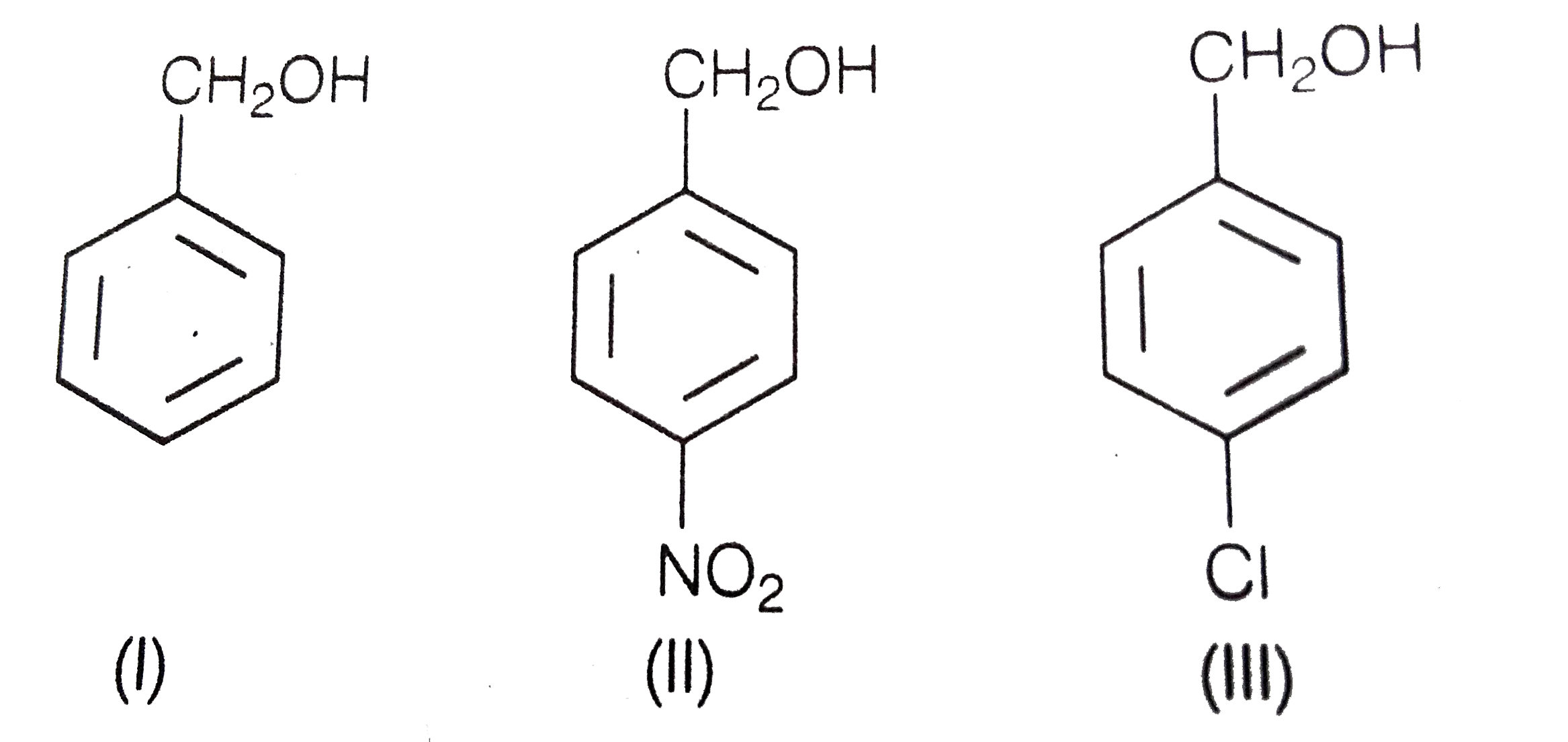
View SolutionArrange the following compounds in increasing order of boiling point :
Prpane-1-ol, butan-1-ol, butan-2-ol, pentan-1-ol
View SolutionWhich of the following are used to convert RCHO into `RCH_(2)OH` ?
View SolutionWhich of the following reactions will yield phenol ?
View SolutionWhich of the following reagents can be used to oxidise primary alcohols to aldehydes ?
View SolutionPhenol can be distinguished from ethanol by the following reagents except
View SolutionWhich of the following are benzylic alcohols ?
View SolutionWhat is the structure and IUPAC name of glycerol ?
View SolutionWrite the IUPAC name of the following compounds.
(a) `CH_(3)-underset(CH_(3))underset(|)(CH)-underset(OH)underset(|)(CH)-underset(C_(2)H_(5))underset(|)(CH)-underset(OH)underset(|)(CH)-CH_(3)`
(b)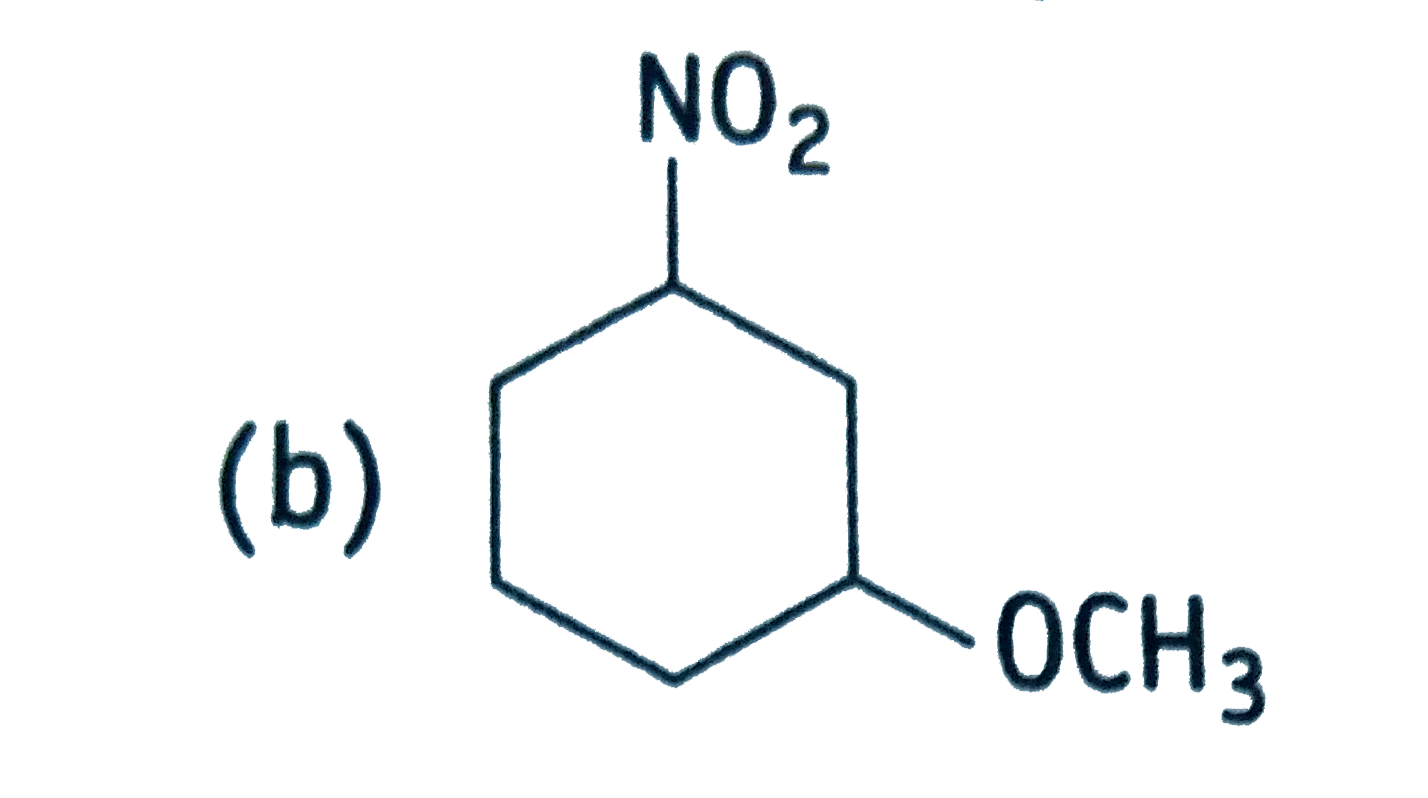
View SolutionWrite the IUPAC name of the compound given below.
`{:(CH_(3)-CH_(2)-C" = "C-OH),(" |"" |"),(" "CH_(3)" "CH_(2)OH):}`
View SolutionName the factors responsible for the solubility of alcohols in water.
View SolutionWhat is denatured alcohol ?
View SolutionSuggest a reagent for the following conversion.

View SolutionOut of 2-chloroethanol and ethanol which is more acidic and why ?
View SolutionSuggest a reagent for conversion of ethanol to ethanal.
View SolutionSuggest a reagent for conversion of ethanol to ethanoic acid.
View SolutionOut of o-nitrophenol and p-nitrophenol, which is more volatile ? Explain?
View SolutionOut of o-nitrophenol and o-cresol which is more acidic ?
View SolutionWhen phenol is treated with bromine water, white precipitate is obtained. Give the structure and the name of the compound formed.
View SolutionWhat is the correct increasing order of acidic strength in the following :
(i) Phenol (ii) p-cresol (iii) p-nitrophenol (iv) o-nitrophenol ?
View SolutionAlcohols react with active metals e.g., Na, K etc., to give corresponding alkoxides. Write down the decreasing order of reactivity of sodium metal towards primary, secondary and tertiary alcohols.
View SolutionWhat happens when benzene diazonium chloride is heated with water ?
View SolutionArrange the following compounds in decreasing order of acidity.
`H_(2)O, ROH, HC -= CH`
View SolutionName the enzymes and write the reactions involved in the preparation of ethanol from sucrose by fermentation.
View SolutionHow can propan-2-one be converted into tert-butyl alcohol ?
View SolutionWrite structural formula for all the isomeric alcohols having the molecular formula `C_(4)H_(10)O`.
View SolutionExplain why is OH group in phenols more strongly held as compared to OH group in alcohols ?
View SolutionExplain why nucleophilic substitution reactions are not very common in phenols ?
View SolutionPreparation of alcohols from alkenes involves the electrophilic attack on alkene carbon atom. Explain its mechanism.
View SolutionExplain why is O=C=O non polar while R-O-R is polar ?
View SolutionWhy is the reactivity of all the three classes of alcohols with conc. HCl and `ZnCl_(2)` (Lucas reagent) different ?
View SolutionWrite steps to carry out the conversion of phenol to aspirin.
View SolutionNitration is an example of aromatic electrophilic substitution and its rate depends upon the group already present in the benzene ring. Out of benzene and phenol, which one is more easily nitrated and why ?
View SolutionIn Kolbe's reactio insteaded of phenol, phenoxide ion is treated with carbon dioxide. Why ?
View SolutionDipole moment of phenol is smaller than that of methanol. Why ?
View SolutionEthers can be prepared by Williamson synthesis which an alkyl halide is reacted with sodium alkoxide. Di-tert-butyl ether can't be prepared by this method. Explain.
View SolutionWhy is the `C-O-H` bond angle in alcohols slightly less than the tetrahedral angle whereas the C-O-C bond angle in ether is slightly greater?
View SolutionExplain why low molecular mass alcohols are soluble in water ?
View SolutionExplain why p-nitrophenol is more acidic than phenol ?
View SolutionExplain why alcohols and ethers of comparable molecular mass have different boiling points?
View SolutionThe carbon-oxygen bond in phenol is slightly stronger than that in methanol. Why ?
View SolutionArrange water, ethanol and phenol in increasing order of acidity and give reason for your answer.
View SolutionMatch the structures of the compounds given in Column I with the name of the compounds given in Column II.
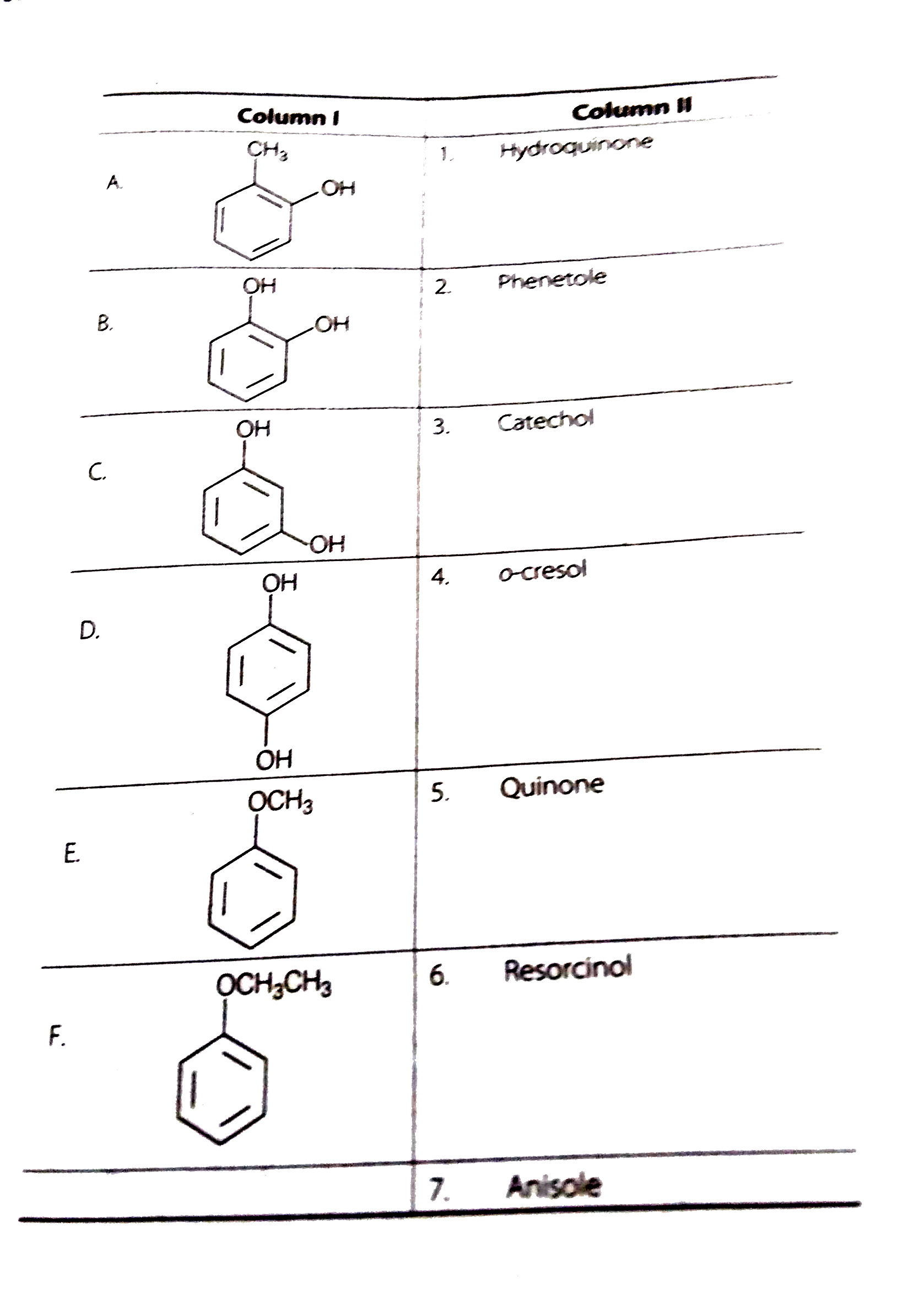
View SolutionMatch the starting material given in Column I with the products formed by these (Column II) in the reaction with HI.
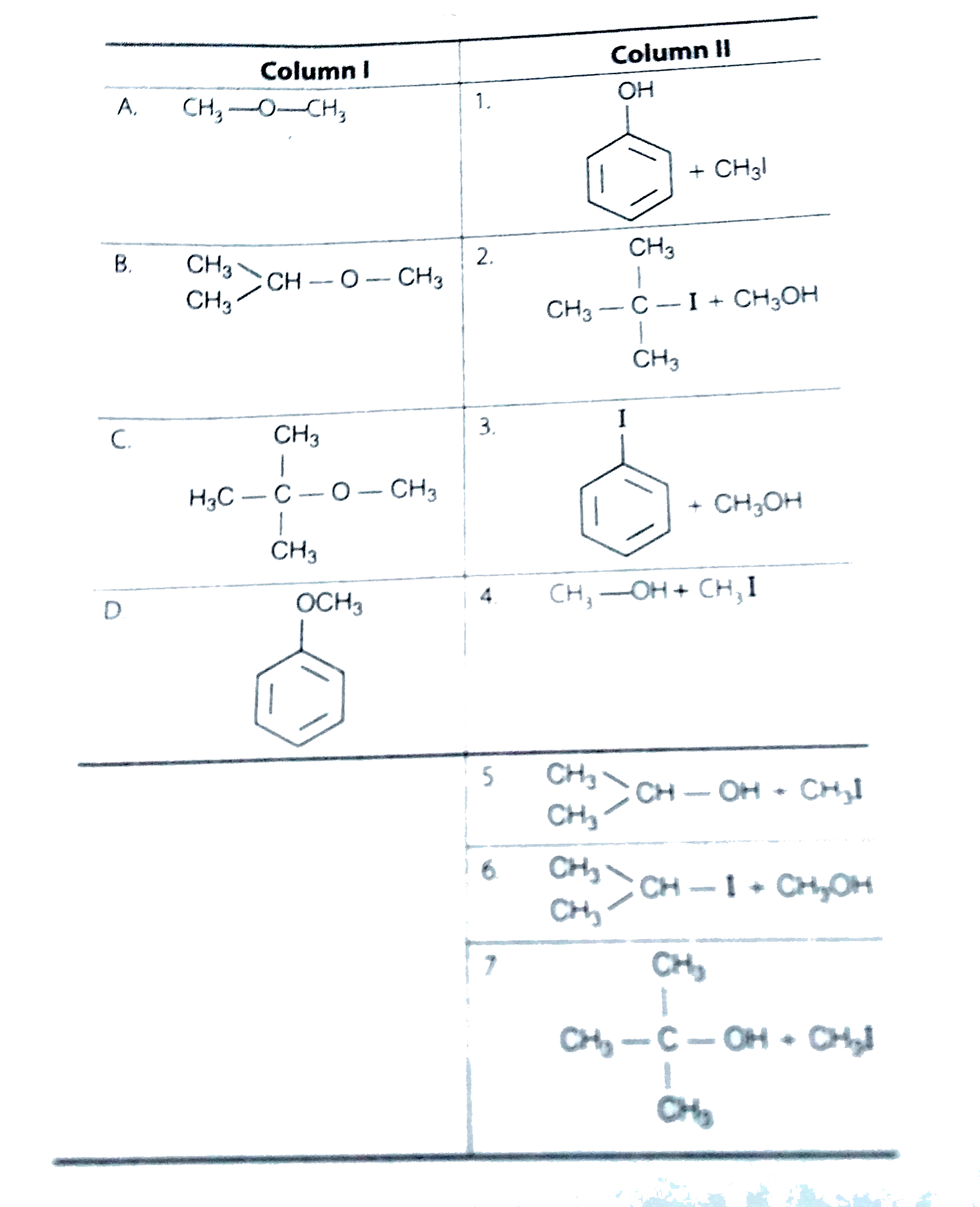
View SolutionMatch the items of Column I with items of Column II.
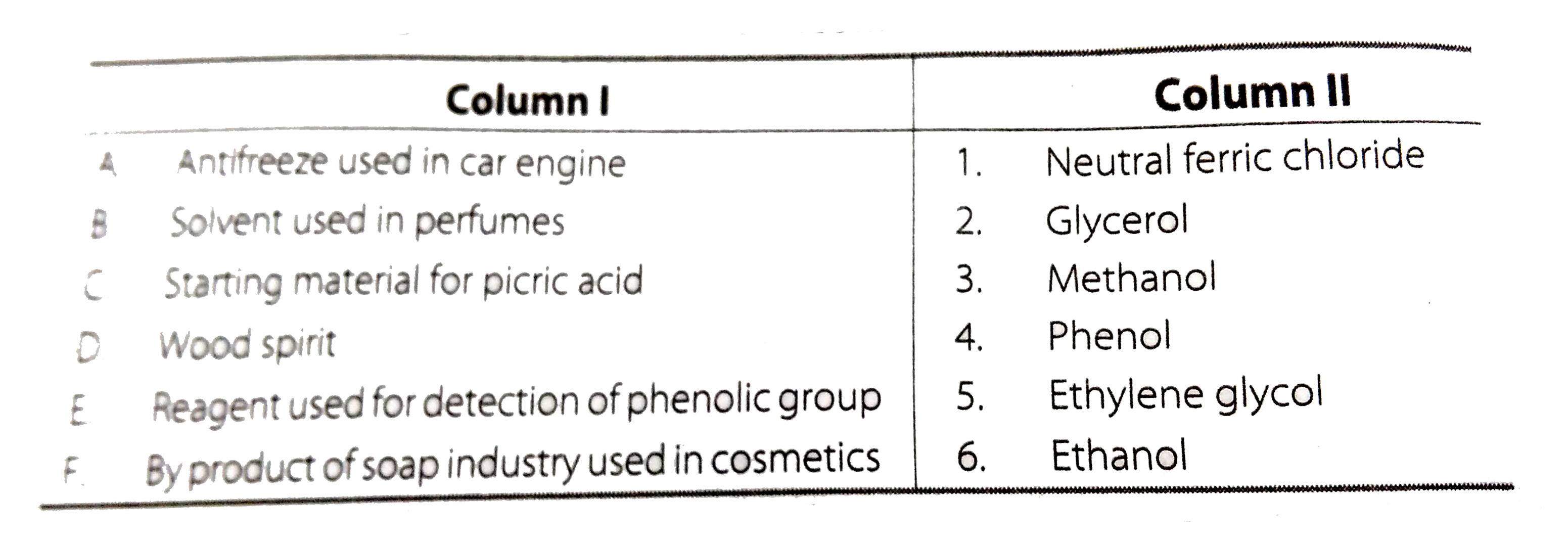
View SolutionMatch the items of Column I with items of Column II.
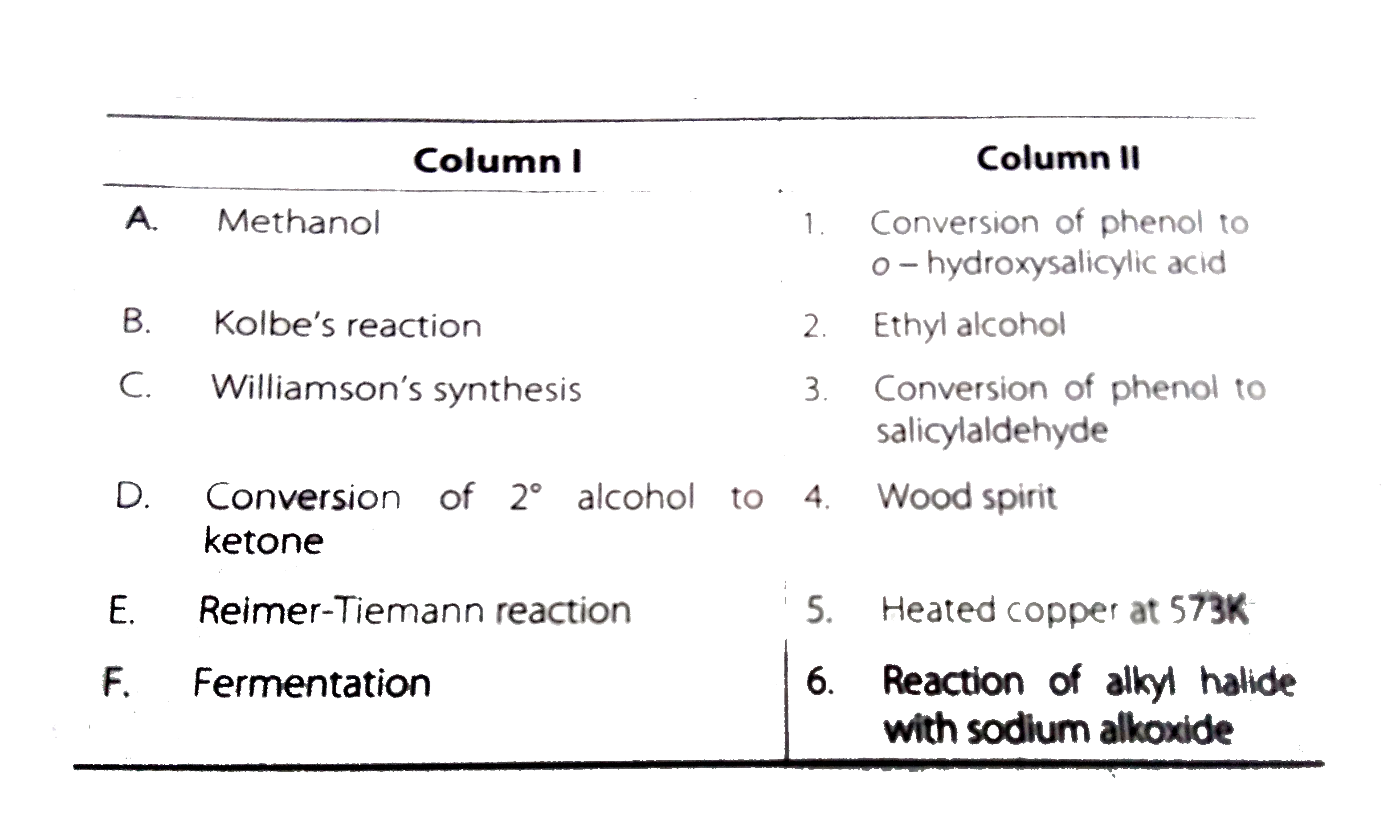
View SolutionAssertion (A) Addition reaction of water to but-1-ene in acidic medium yields butan-1-ol.
Reason (R) Addition of water in acidic medium proceeds through the formation of primary carbocation.
(a)Assertion and reason both are correct and reason is correct explanation of assertion.
(b)Assertion and reason both are wrong statements.
(c)Assertion is correct statement but reason is wrong statement.
(d)Assertion is wrong statement but reason is correct statement.
View SolutionAssertion (A) p-nitrophenol is more acidic than phenol.
Reason (R) Nitro group helps in the stabilisation of the phenoxide ion by dispersal of negative charge due to resonance.
View SolutionAssertion (A) IUPAC name of the compound
`CH_(3)-underset(CH_(3))underset(|)(CH)-O-CH_(2)-CH_(2)-CH_(3)` is 2-ethoxy-2-methylethane
Reason (R) In IUPAC nonmenclature, ether is regarded as hydrocarbon derivative in which a hydrogen atom is replaced by -OR and or -OAr group [where, R = alkyl group and Ar = aryl group].
View SolutionAssertion (A) Bond angle is ethers is slightly less than tetrahedral angle.
Reason (R) There is a repulsion between the two bulky (-R) groups.
View SolutionAssertion (A) Boiling points of alcohols and ethers are high.
Reason (R) They can form intermolecular hydrogen-bonding.
View SolutionAssertion (A) Like bromination of benzene, bromination of phenol is also carried out in the presence of Lewis acid.
Reason (R) Lewis acid polarises the bromine molecule.
View SolutionAssertion (A) o-nitrophenol is less soluble in water than the m and p-isomers.
Reason (R) m and p-nitrophenols exist as associated molecules.
View SolutionAssertion (A) Ethanol is a weaker acid than phenol.
Reason (R) Sodium ethoxide may be prepared by the reaction of ethanol with aqueous NaOH.
View SolutionAssertion (A) Phenol forms 2, 4, 6-tribromophenol o treatment with `Br_(2)` in carbon disulphide at 273K.
Reason (R) Bromine polarises in carbon disulphide.
(a)Assertion and reason both are correct and reason is correct explanation of assertion.
(b)Assertion and reason both are wrong statements.
(c)Assertion is correct statement but reason is wrong statement.
(d)Assertion is wrong statement but reason is correct statement.
View SolutionAssertion (A) Phenols give o-and p-nitrophenol on nitration with conc. `HNO_(3)` and `H_(2)SO_(4)` mixture.
Reason (R) `-OH` group in phenol is o-,p-directing.
(a)Assertion and reason both are correct and reason is correct explanation of assertion.
(b)Assertion and reason both are wrong statements.
(c)Assertion is correct statement but reason is wrong statement.
(d)Assertion is wrong statement but reason is correct statement.
View SolutionWrite the mechanism of the reaction of HI with methoxybenzene.
View Solution(a) Name the starting material used in the industrial preparation of phenol.
(b) Write complete reaction for the bromination of phenol in aqueous and non-aqueous medium.
(c) Explain why Lewis acid is not required in bromination of phenol ?
View SolutionHow can phenol be converted to aspirin ?
View SolutionExplain a process in which a biocatalyst is used industrial preparation of a compound known to you.
View Solution
All Questions questions and complete solutions for chapter ALCOHOLS, PHENOLS AND ETHERS of NCERT CHEMISTRY (ENGLISH) of Class 12